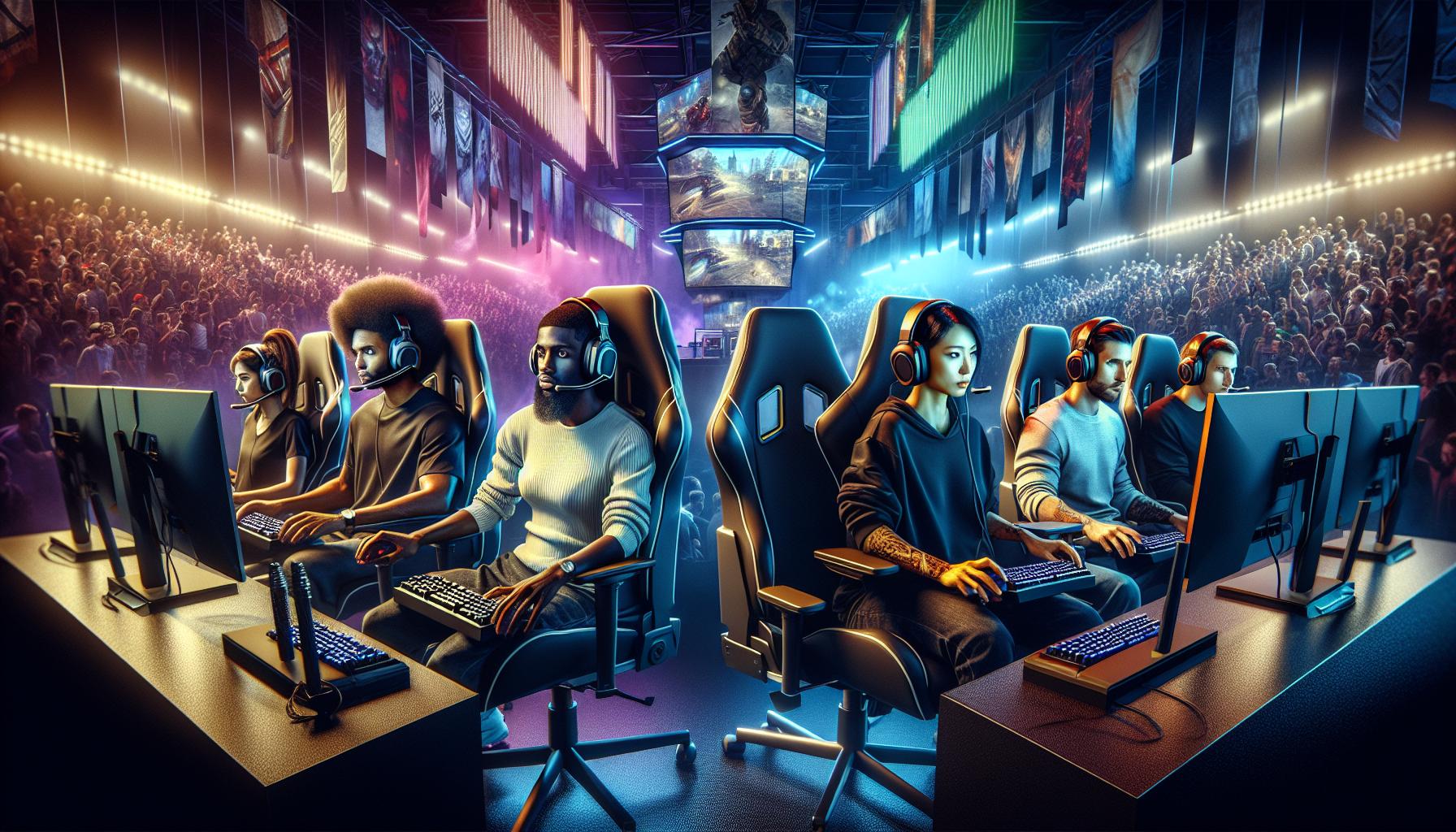Key Takeaways
- Origins of Esports: Esports began in the early 1970s with games like “Spacewar!” and evolved through landmark tournaments such as the “Space Invaders Championship” in 1980, laying the groundwork for competitive gaming culture.
- Technological Advancements: The popularity of esports surged in the 1990s with the rise of personal gaming consoles and the internet, paving the way for iconic games like “Doom,” “Quake,” and “Counter-Strike,” which established modern competitive play.
- Impact of Major Tournaments: Events such as The International and the League of Legends World Championship highlighted the financial potential of esports, with prize pools in the millions and global viewership growth.
- Streaming Revolution: Platforms like Twitch transformed how esports events are experienced, increasing accessibility and audience engagement, particularly during the pandemic when traditional sports were on hold.
- Cultural Integration: Esports has evolved into a mainstream entertainment form, influencing cultural trends and creating new career opportunities in gaming, education, and sponsorships.
- Future of Esports History Games: The future includes innovations like VR and AR, educational esports titles, and greater community involvement, which promise to enhance player experiences and broaden the appeal of historical gaming.
Esports has evolved from casual gaming into a global phenomenon, captivating millions with its competitive spirit and community engagement. The history of esports is rich and varied, showcasing the rise of iconic games and legendary players who’ve shaped the industry. From humble beginnings in small tournaments to grand championships with multi-million dollar prize pools, the journey is nothing short of remarkable.
As technology advanced, so did the complexity and popularity of esports titles. Games like “StarCraft,” “Counter-Strike,” and “League of Legends” not only transformed the gaming landscape but also created a vibrant ecosystem of fans, teams, and sponsors. Understanding this history offers valuable insights into how esports became a cultural powerhouse, influencing entertainment and sports alike.
Esports History Game
Esports originated in the early 1970s with a simple game called “Spacewar!” This competitive gaming experience attracted a small group of enthusiasts who organized tournaments. During the 1980s, arcade games like “Pac-Man” and “Donkey Kong” further laid the groundwork for competitive gaming culture. The first notable tournament, the “Space Invaders Championship,” occurred in 1980, marking a significant milestone in esports.
In the 1990s, the expansion of personal gaming consoles and the internet revolutionized esports. Titles such as “Doom” and “Quake” popularized multiplayer gaming, leading to larger competitions. “The Red Annihilation” tournament in 1997, featuring “Quake,” garnered widespread attention and included a prize of a Ferrari.
The early 2000s saw the emergence of dedicated esports organizations and leagues. Games like “StarCraft” in South Korea became cultural phenomena. The establishment of the Korea e-Sports Association (KeSPA) in 2000 formalized competitive gaming in the region.
By the late 2000s, platforms such as Twitch facilitated broadcasting esports events to global audiences. Iconic titles like “Counter-Strike” and “League of Legends” dominated the scene. Major tournaments, such as The International and the League of Legends World Championship, boasted multi-million dollar prize pools, attracting professional players.
In the 2010s, esports transitioned into a mainstream entertainment form. Sponsorships, brand partnerships, and media coverage surged, creating lucrative opportunities for teams and players. Events filled stadiums worldwide, showcasing the sheer scale of competitive gaming.
Today, esports encompasses a vast range of genres and continues to grow. Competitive gaming has established itself as a legitimate career path, with universities offering scholarships and dedicated esports programs. The continued evolution of technology and media ensures that esports will evolve further, reinforcing its position as a prominent cultural force.
The Rise of Competitive Gaming

Competitive gaming has evolved significantly since its inception, shifting from simple recreation to a powerhouse of global engagement. This section explores the early years of video games and the emergence of organized tournaments.
Early Beginnings of Video Games
The origins of video games date back to the early 1970s. The first influential game, “Spacewar!,” developed in 1962, allowed two players to engage in intense space combat. This early interaction laid the groundwork for a competitive mindset among gamers. In the late 1970s, the introduction of arcade games like “Pong” revolutionized gaming, attracting crowds and igniting interest in multiplayer experiences. The 1980s saw the rise of home gaming consoles, further boosting player participation and establishing a budding community.
Emergence of Tournaments
The first notable gaming tournament, the “Space Invaders Championship,” took place in 1980. This competitive event marked a turning point, showcasing the potential for organized play. The success of such tournaments propelled the formation of organized leagues and events in the following decades. In the 1990s, multiplayer games like “Doom” and “Quake” drew significant player bases, leading to larger and more formal gatherings. By the early 2000s, South Korea became a focal point for esports, particularly with “StarCraft,” resulting in professional teams and sponsorships. This foundation paved the way for global tournaments and engagements that define the esports landscape today.
Evolution of Esports Games

Esports games have evolved significantly since their inception, spanning several decades and various gaming genres. This evolution showcases landmark titles and the pivotal role played by game developers in shaping competitive gaming.
Landmark Titles in Esports History
“Spacewar!” (1972)
“Spacewar!” marked the birth of competitive gaming, laying the foundation for future esports titles.
“Space Invaders” (1980)
“Space Invaders” sparked the first significant esports tournament, drawing interest and players worldwide.
“Street Fighter II” (1991)
“Street Fighter II” introduced the fighting game genre to esports, leading to organized tournaments and a dedicated fan base.
“Counter-Strike” (1999)
“Counter-Strike” set the stage for team-based first-person shooters, establishing competitive play and nurturing esports communities.
“StarCraft” (1998)
“StarCraft” became a cornerstone of esports in South Korea, with a competitive scene that popularized live broadcasting and professional players.
“Dota 2” (2013)
“Dota 2” showcased the potential for massive prize pools, with The International tournament offering millions, attracting global viewership.
“League of Legends” (2009)
“League of Legends” dominated the esports landscape during the 2010s, fueling a plethora of tournaments and a massive fan following.
The Role of Game Developers
Game developers play a critical role in shaping the esports landscape. They create engaging titles that support competitive play and community involvement. Developers implement balance updates that maintain fair competition, making adjustments based on player feedback and performance metrics.
Organized support from developers, such as tournaments and promotional events, fosters growth within the esports scene. Titles like “Overwatch” and “Valorant” exemplify this commitment through dedicated esports leagues and community initiatives.
Furthermore, developers contribute to the sustainability of esports by establishing partnerships with sponsors and offering infrastructure for broadcasting. These initiatives enhance viewer experience and increase accessibility to competitive gaming.
Major Milestones in Esports

Esports has witnessed numerous significant milestones that have shaped its development and popularity. Key tournaments and the rise of streaming platforms played pivotal roles in transforming esports into a global phenomenon.
Significant Tournaments and Events
Numerous tournaments marked crucial developments in esports.
- 1980: Space Invaders Championship: This tournament, often regarded as the first official esports event, attracted more than 10,000 participants, laying the groundwork for future competitions.
- 1997: Red Annihilation: Hosted by the game “Quake,” this tournament featured pro players competing for a Ferrari, integrating stakes into competitive gaming.
- 2011: The International: This Dota 2 tournament became a milestone, offering a prize pool exceeding $1 million, showcasing the potential for significant financial rewards in esports.
- 2013: League of Legends World Championship: Attracting over 32 million viewers, this championship highlighted the growing interest in esports, furthering its recognition as a legitimate entertainment form.
- 2020: PUBG Global Invitational: This tournament marked one of the largest prize pools in esports history, demonstrating the genre’s potential for substantial rewards and international appeal.
These events, among others, solidified esports’ status, establishing competitive gaming arenas that rival traditional sports.
Influence of Streaming Platforms
Streaming platforms revolutionized how esports competitions reach audiences.
- 2007: Twitch Launch: Twitch transformed live streaming, enabling content creators to broadcast gameplay and engage with viewers directly.
- 2013: Major Partnerships: Twitch’s partnerships with key esports events, such as the League of Legends Championship Series, increased viewership and established a dedicated esports audience.
- 2015: TwitchCon: This annual convention celebrated gaming culture, fostering community interaction and expanding esports’ reach.
- 2020: Growth Due to Pandemic: With traditional sports on hold, esports thrived, capitalizing on streaming platforms for viewership and engagement.
These platforms cultivated a community atmosphere and facilitated the growth of esports, making it more accessible and appealing to a global audience.
Future of Esports History Games
The future of esports history games promises innovation, engagement, and cultural significance. Technological advancements will enhance gameplay mechanics, creating immersive experiences for players and audiences alike. Virtual reality (VR) and augmented reality (AR) are set to redefine how players interact with historical contexts within games, making historical narratives more dynamic.
The rise of educational esports titles will further integrate history into gaming, allowing players to learn while playing. Game developers are exploring this genre, focusing on accuracy in historical representation and interactive storytelling. Titles combining competitive elements with educational content will attract players interested in history and gaming.
The evolution of esports leagues and organizations is expected to include more history-based competitions. Competitive events centered on historical games will facilitate a unique niche within the larger esports ecosystem, drawing diverse audiences. The sponsorship landscape will evolve to support these specialized competitions, fostering innovation.
Community involvement will play a crucial role in shaping future esports history games. Forums, social media, and fan-driven content will enhance conversations around history in gaming, facilitating engagement and feedback for developers. Collaborative projects between historians and game creators will promote authentic representations, enriching the gaming experience.
Global accessibility will become essential for esports history games, capitalizing on the increasing availability of high-speed internet, mobile devices, and streaming platforms. This will encourage broader participation and viewing audiences, democratizing access to historical gaming content.
Additionally, the focus on cross-platform play will ensure a unified community experience. Gamers across various devices will connect, compete, and share insights, fostering camaraderie and encouraging player experimentation with historical themes.
Overall, the future of esports history games holds significant potential for growth, cultural integration, community development, and technological enhancement, enriching both the gaming and educational landscapes.
Esports Has Transformed
Esports has transformed from its humble beginnings into a dynamic cultural force that captivates millions. The journey through its history reveals how gaming has evolved into a respected competitive arena. With each technological advancement and landmark title, esports continues to reshape entertainment and community engagement.
As the future unfolds, the integration of innovative gameplay and educational elements promises to further enrich the esports landscape. The potential for immersive experiences through VR and AR will likely attract new audiences while fostering a deeper understanding of history. With global accessibility on the rise, esports history games are set to become a significant part of both gaming and educational realms, paving the way for exciting developments ahead.